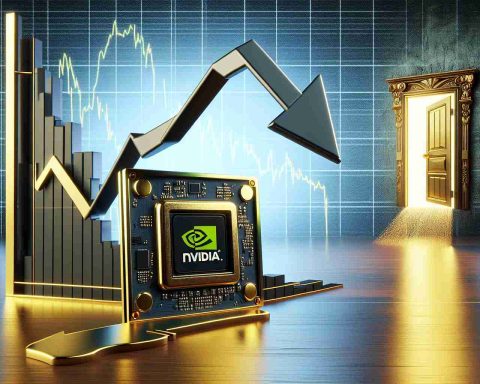- Jensen Huang’s prediction at CES suggests practical quantum systems may be two decades away, impacting stock values significantly.
- The sector faces challenges with a previous 50% hit in venture capital, risking delisting for key players like D-Wave and Rigetti.
- Nvidia’s influence grows due to its pivotal role in supplying advanced error correction technology for quantum research.
- Despite challenges, D-Wave’s CEO counters with optimism, highlighting AI and quantum computing integration as a potential breakthrough.
- The future remains uncertain, but the combination of caution, strategic advancement, and Nvidia’s contributions may drive industry innovation.
The quantum computing world is spiraling after Nvidia CEO Jensen Huang’s unexpected forecast shook the industry at CES. In a bold financial address, Huang predicted that truly practical quantum systems might remain out of reach for another two decades. His remarks unleashed a wave of anxiety, erasing nearly 50% of stock value for major players like D-Wave, Rigetti, and IONQ, while UK’s Arqit Quantum saw a severe 30% dip.
The Quantum Shockwave
Huang’s prediction sent shockwaves through a sector already buffeted by a 50% decline in venture capital investments last year. Companies like D-Wave and Rigetti are now fiercely battling to keep their shares above the crucial $1 mark, a threshold necessary to prevent delisting. This latest downturn threatens to deepen the financial woes of an industry struggling to cross the chasm from theory to commercial reality.
Nvidia’s Rising Influence
Amid the turmoil, Nvidia’s prominence is growing. Known for its advanced error correction technology, Nvidia’s chips are becoming key components in quantum research projects. While quantum companies grapple with uncertain futures, Nvidia thrives, its innovations proving indispensable for current simulation and design processes.
Industry Leaders Face Off
In response to Huang’s statements, D-Wave CEO Dr. Alan Baratz fired back, asserting that Huang’s bleak outlook misleads the public. Baratz highlighted D-Wave’s strategic approaches and touted potential breakthroughs in the fusion of AI with quantum computing, suggesting a bright horizon despite the prevailing skepticism.
Outlook for Innovators
As quantum computing companies navigate these turbulent waters, a blend of caution and optimism is essential. With Nvidia spearheading critical discussions and offering crucial technology, the industry’s path remains fraught with both challenges and possibilities. Exploring the intersection of AI and quantum computing could unlock revolutionary advancements, steering the industry toward a future filled with promise and innovation.
Quantum Computing: Navigating the Turbulent Waters of Innovation
## Industry Landscape: Challenges and Opportunities
What are the key pros and cons of current quantum computing developments?
Pros:
1. Advanced Computational Capabilities: Quantum computers promise unparalleled processing speeds, potentially solving complex problems in seconds that classical computers would take years to solve.
2. Innovations in Error Correction: Companies like Nvidia have developed error correction technologies that significantly improve quantum research, making simulations more accurate and reliable.
3. AI and Quantum Fusion: There’s potential for groundbreaking advancements at the intersection of AI and quantum computing, offering new solutions in various industries from pharmaceuticals to financial services.
Cons:
1. Limited Commercial Availability: Practical quantum systems remain largely theoretical, with Nvidia’s forecast suggesting they might be two decades away from widespread applicability.
2. Market Volatility: Recent events have highlighted high market volatility, resulting in significant stock value fluctuations for major players in the field.
3. Venture Capital Decline: A 50% reduction in venture capital investments last year poses a financial hurdle that companies must navigate.
How is Nvidia influencing the quantum computing sector?
Nvidia is playing a critical role in the quantum computing landscape. Their advanced technologies, particularly in error correction, are deemed essential for current research efforts. While other companies deal with financial instability, Nvidia is leveraging its robust position to lead vital discussions and provide indispensable technology for the simulation and design phases of quantum projects. This influence places Nvidia at the center of the quantum computing future.
For further insights, visit Nvidia.
What are the market predictions and future trends for quantum computing?
Market analysts remain cautious yet optimistic about the future of quantum computing. While immediate commercial viability is not in sight, advancements in AI and quantum fusion could dramatically shift the landscape.
Predictions and Trends:
1. Continued Investment in R&D: Companies will intensify their research and development activities to overcome existing technical barriers and hasten the arrival of practical quantum systems.
2. Growth in Collaborative Efforts: Partnerships between traditional tech companies and quantum startups are anticipated to accelerate, providing both stability and innovation.
3. Sustainability and Efficiency Focus: As environmental concerns grow, there will be a push towards developing quantum systems that are not only powerful but also energy-efficient and sustainable in their operations.
4. Sector Diversification: Expect to see an increase in applications across diverse sectors, demonstrating quantum computing’s vast potential beyond current known capabilities.
To explore the evolving landscape, consider the insights from D-Wave or Rigetti.
In conclusion, despite current challenges, the quantum computing future remains promising. Innovations, strategic collaborations, and the drive towards integrating AI with quantum technologies will continue to shape this dynamic industry.


















